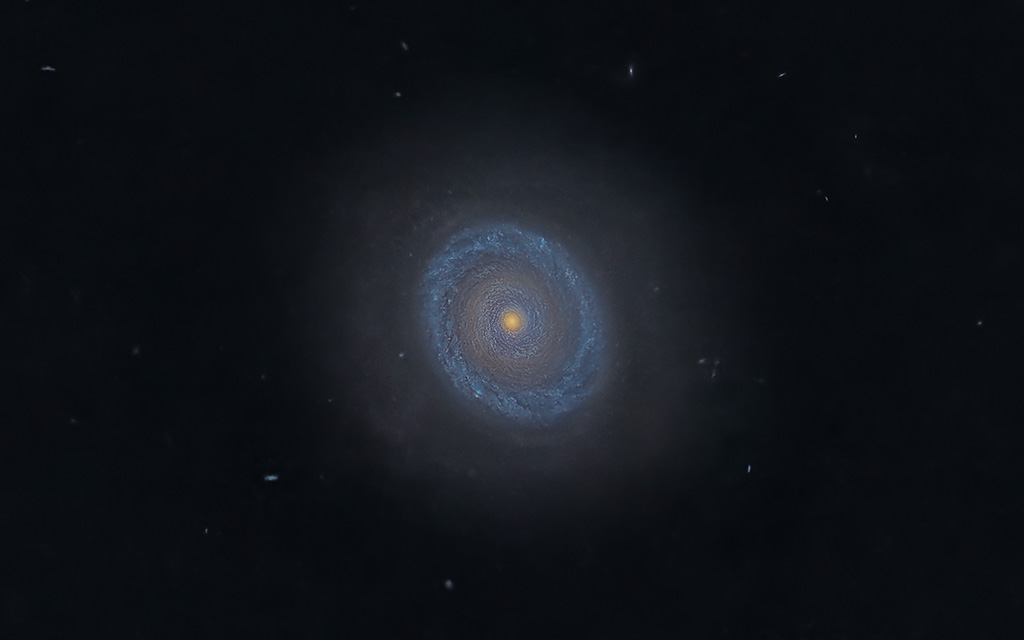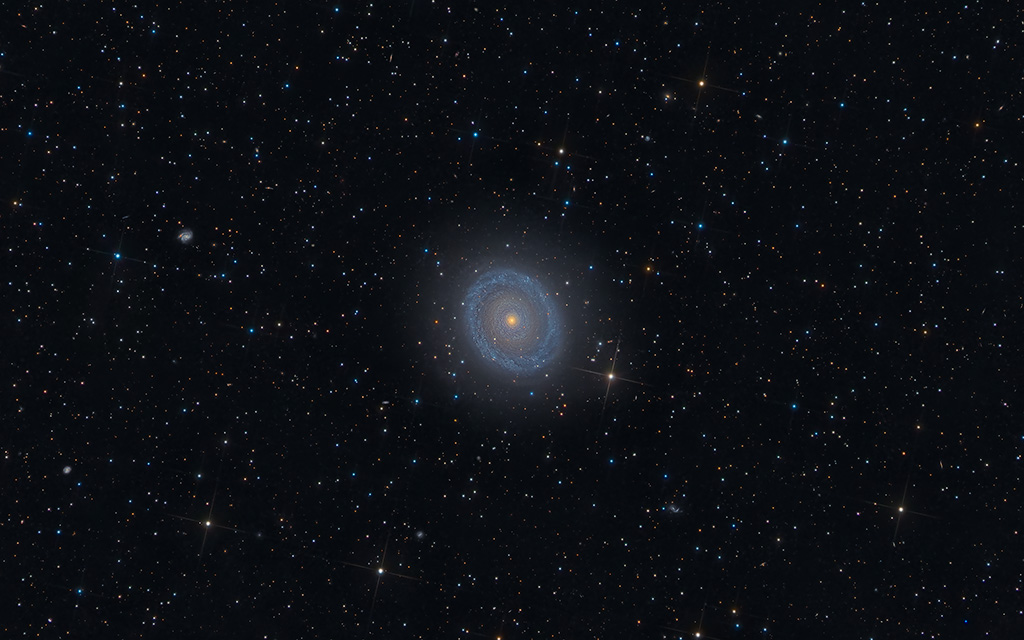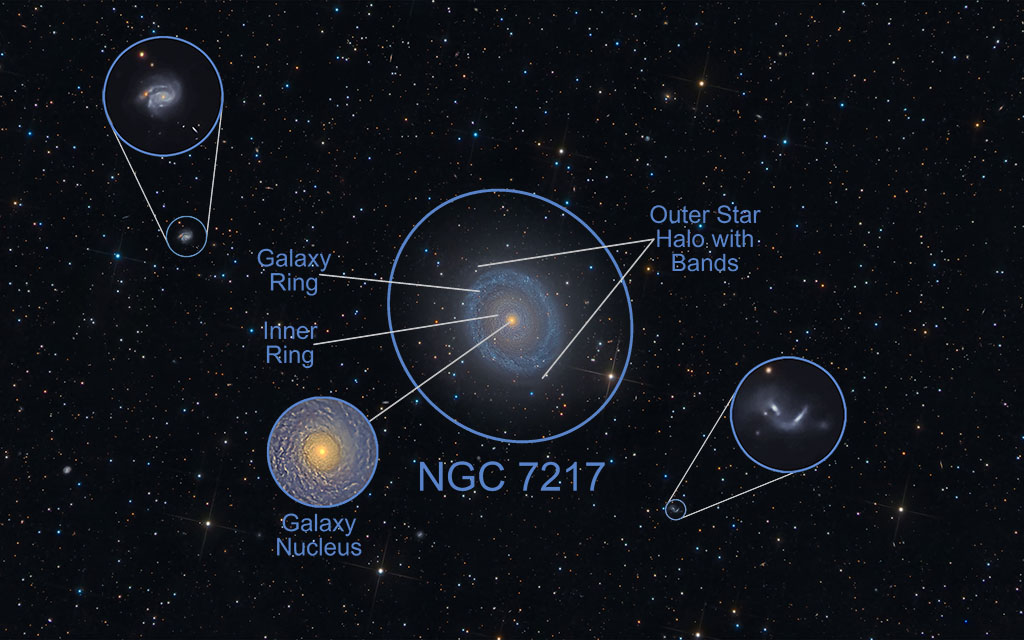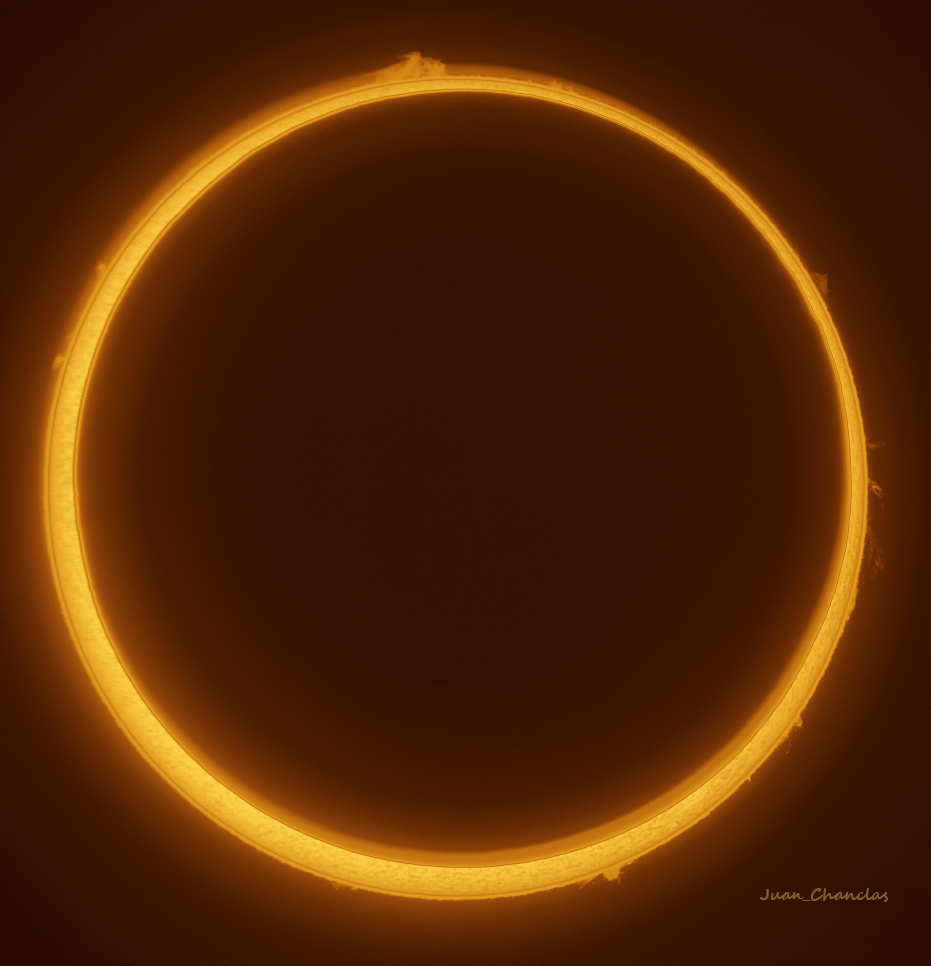Page 6 of 7
Re: Submissions: 2023 October
Posted: Sun Oct 29, 2023 8:46 am
by SH2-119. The clamshell nebula
Alex Battù and Luca Barcaro would like to submit SH2-119, the clamshell nebula.
2200 years ago, when the photons of light left this nebula to reach us, the Earth was definitely another place. The cosmic time machine, the telescope, this time was pointed towards the constellation Cygnus, more precisely towards Sh2-119. Gas and dust envelop the main star, 68-Cygni being mostly responsible for the ionization of the gas around it. This ionization makes the gases all colored at different wavelengths, from blue to green, passing through all shades of brown and orange. The dark nebula filaments above contrast strongly with both the glow of the nebula and the rich field full of stars in the background. These filaments are clouds containing mostly gas (hydrogen and helium) and a minimal fraction of dust (about 1%), responsible for the appearance of the cloud. These dusts, although minimal, absorb the light, making the nebula completely dark. Sh2-119 is a celestial signature of an ancient explosion that released gas and dust into the universe, forming new stars and planets. The silk effect of the nebula makes us think of a white colored pillow in a bed of stars, but, among that dust, stars and planets are forming in the most violent and destructive processes.
 SH2-119. The clamshell Nebula
SH2-119. The clamshell Nebula by
Astro Divers, su Flickr
Re: Submissions: 2023 October
Posted: Sun Oct 29, 2023 4:47 pm
by Alson Wong
The Veil Nebula
Copyright: Alson Wong
Portions of the Veil Nebula supernova remnant: NGC 6960 (the "Witch's Broom") at top, and Fleming's Triangular Wisp at lower left.
Re: Submissions: 2023 October
Posted: Sun Oct 29, 2023 4:49 pm
by Alson Wong
Portion of the Veil Nebula - NGC 6992 and NGC 6995
Copyright: Alson Wong
Re: Submissions: 2023 October
Posted: Sun Oct 29, 2023 4:50 pm
by Alson Wong
The Flying Bat Nebula and the Squid Nebula
Copyright: Alson Wong
Re: Submissions: 2023 October
Posted: Sun Oct 29, 2023 7:26 pm
by salvatorecerruto
 Partial lunar eclipse
Partial lunar eclipse by
Salvatore Cerruto, su Flickr
Last night, I had the privilege of witnessing a partial lunar eclipse, an event always filled with anticipation and fascination. The atmospheric conditions, which are never quite predictable at this time of the year, not only allowed us to observe this beautiful phenomenon but also made the moment even more special by creating a lunar halo that formed right at that moment, as if to highlight the spectacle taking place in the sky. Adding to the beauty of this scene were the presence of Jupiter in conjunction and the open cluster of the Pleiades.
Here is a brief description of the two celestial phenomena I was able to observe last night. The first, the partial lunar eclipse, is a celestial event in which the moon's disc is partially obscured by the shadow cast by the Earth. The second, the lunar halo, is an optical phenomenon that results in the formation of a ring of light around the moon and occurs when moonlight interacts with ice crystals suspended in the atmosphere and is refracted to create the described effect. Lunar halos typically have a diameter of about 22 degrees.
Shooting data: Nikon D800 + Sigma 35mm f/1.4, a blend of two shots
f/7.1, 8 sec., ISO-640
f/7.1, 1/200 sec., ISO-640 (for the detail of the eclipsed moon)
Date: October 28, 2023
Author: Salvatore Cerruto
Location: Modica, Italy
Re: Submissions: 2023 October
Posted: Mon Oct 30, 2023 1:28 am
by Yead Muhammad Ivan
Re: Submissions: 2023 October
Posted: Mon Oct 30, 2023 1:58 am
by bodon
Pencil Nebula NGC2736
I captured this image from my back yard in Nowra NSW. This slender and elongated emission nebula resides in the southern constellation Vela. It provides a fascinating glimpse into the aftermath of a supernova explosion, revealing the intricate interplay of cosmic forces in space.
I used an Askar FRA500, ZWO2600MM Pro camera with Antlia Ha and Oiii 3nm filters, exposing 78 frames at 240 seconds each for Ha and 140 frames for Oiii. These were taken over the course of several nights from 25 May to 20 July 23.
I applied a gain of 100 and maintained a temperature of minus 10. The images were processed, involving the stacking of 40 bias and 35 flat frames for each filter. Subsequently, I stretched and coloured the image using the HOO method in PixInsight, resulting in a total of 14.0 hours.
Re: Submissions: 2023 October
Posted: Mon Oct 30, 2023 5:43 am
by Tom Glenn
Hunter's Moon and ISS
 Hunter's Moon and ISS
Hunter's Moon and ISS by
Tom Glenn, on Flickr
I captured this image of the International Space Station in transit across the full Hunter's Moon, approximately 12 hours after the partial lunar eclipse that was visible from some locations. The image is a single exposure of 0.3ms (no compositing or stacking) that was extracted from a video sequence of the event, and shows significant details on the ISS, which is observed over the southern highlands region of the Moon near the prominent rays of the crater Tycho (
link to full size image).
Image details:
October 29, 2023
01:55:35am local time (PDT)
San Diego, CA
6" f/6 Newtonian telescope
ASI183mm camera w/610nm pass filter and coma corrector
Single 0.3ms exposure
Re: Submissions: 2023 October
Posted: Mon Oct 30, 2023 10:07 am
by kentbiggs
NGC 7217 ~ Multi-Ringed Galaxy
URL:
https://www.kentbiggs.com/images/galaxies/N7217-2.htm
Exciting new detail in this image showing 5 or more rings including outer star halo, outer blueish ring, middle grey ring, inner blue-grey ring, 2nd inner dark ring, and yellow-white nucleus!
Zoomed in view without stars. Hover over to show stars!
https://www.kentbiggs.com/images/galaxi ... _4Kzns.jpg
https://www.kentbiggs.com/images/galaxi ... GB_4Kz.jpg
Full image. Hover over to see annotations:
No Stars URL:
https://www.kentbiggs.com/images/galaxi ... B_4Kns.jpg
Full screen URL:
https://www.kentbiggs.com/images/galaxi ... RGB_4K.jpg
Enlargement URL:
https://www.kentbiggs.com/images/galaxi ... GB_4Kz.jpg
Integration time: 16 hours. Copyright Kent E. Biggs
Clear skies,
www.kentbiggs.com
Houston, Texas
Re: Submissions: 2023 October
Posted: Mon Oct 30, 2023 1:58 pm
by Wolfgang
NGC1365
https://www.astrobin.com/j39n4r/
Copyright: Wolfgang Promper
Re: Submissions: 2023 October
Posted: Mon Oct 30, 2023 4:27 pm
by maxmarchini
 RCW98 - Coffee Bean Nebula in Nor - TL CH1 202305 - DynSHO
RCW98 - Coffee Bean Nebula in Nor - TL CH1 202305 - DynSHO by
Massimo Marchini, su Flickr
Due to the bad weather, for over two months, I decided to subscribe to a remote telescope service; so, I can now process some pictures of objects not visible from my home observatory.
Looking for some interesting objects, I found this uncommon HII region; it’s included only in the RCW Catalogue (Rodgers, Campbell and Whiteoak).
I developed the picture using (for the first time) a Dynamic SHO palette, which uses factors based on pixel values (instead of mean values). The image resulting has more color deepness.
Happy Halloween
Posted: Mon Oct 30, 2023 8:39 pm
by MrRat
The spooky Ghost of Cassiopeia
IC 63 taken from my backyard in Hartford, AL, USA. 74 shots at 300 seconds each taken with a ZWO ASI2600MC camera, William Optics GT81 telescope, and Losmandy GM811G equatorial mount. The last set of images were taken Oct. 30th, 2023.
Re: Submissions: 2023 October
Posted: Tue Oct 31, 2023 3:55 am
by Juan_Chanclas
Ring of Fire - Annular Eclipse October 2023
High resolution:
https://www.astrobin.com/9vmah5/
Copyright: Juan_Chanclas
I went to Chetumal in Quintana Roo, Mexico and I captured this image of the eclipse . It was my first solar Eclipse that I captured! I hope you enjoy it !!
Re: Submissions: 2023 October
Posted: Tue Oct 31, 2023 6:00 am
by Astrodude13
 Ptolemy's Cluster - M7
Ptolemy's Cluster - M7 by
Blake Estes, on Flickr
This image consists 36 x 600 second exposures
A collaboration between Christian Sasse and I.
Camera: ZWO ASI 6200MC Pro
Telescope: TEC 160
Filter: Optolong L-Pro
Mount: Paramount ME
Location: Chile
Re: Submissions: 2023 October
Posted: Tue Oct 31, 2023 11:28 pm
by SparkyHT
Flying Bat and Squid nebulae (Sh2-129/OU4) 88h 10m over 20 nights. SpaceCat51/ASI2600MMC. Processing in Pixinsight.
This has got to be one of the toughest images I've processed. Despite having 54 hours of OIII, a lot of work had to be done to bring out OU4. The stars are RGB and were added to replace the HOO stars for a much more natural look.
Full res image and info:
https://astrob.in/azflsd/0/
Equipment:
Imaging Telescopes Or Lenses: William Optics SpaceCat 51
Imaging Cameras: ZWO ASI2600MM Pro
Mounts: Astro-Physics Mach2 GTO
Filters:
Chroma Blue 31 mm · Chroma Green 31 mm · Chroma H-alpha 3nm Bandpass 31 mm · Chroma OIII 3nm Bandpass 31 mm · Chroma Red 31 mm
Software:
Open PHD Guiding Project PHD2 · Pleiades Astrophoto PixInsight · Russell Croman Astrophotography BlurXTerminator · Russell Croman Astrophotography NoiseXTerminator · Russell Croman Astrophotography StarXTerminator · Starkeeper Voyager
Acquisition details:
Dates:
July 9, 2023 · July 10, 2023 · July 17, 2023 · July 18, 2023 · July 30, 2023 · Aug. 8, 2023 · Aug. 12, 2023 · Aug. 15, 2023 · Aug. 16, 2023 · Aug. 17, 2023 · Aug. 19, 2023 · Aug. 22, 2023 · Aug. 23, 2023 · Aug. 26, 2023 · Aug. 27, 2023 · Aug. 29, 2023 · Aug. 30, 2023 · Aug. 31, 2023 · Sept. 1, 2023 · Sept. 3, 2023
Frames:
Chroma Blue 31 mm: 60×180″(3h)
Chroma Green 31 mm: 60×180″(3h)
Chroma H-alpha 3nm Bandpass 31 mm: 297×300″(24h 45′)
Chroma OIII 3nm Bandpass 31 mm: 653×300″(54h 25′)
Chroma Red 31 mm: 60×180″(3h)
Integration: 88h 10′
Re: Submissions: 2023 October
Posted: Thu Nov 02, 2023 2:45 pm
by Groovynight
VdB 14, VdB 15, Sh2-202 & Stock 23 in Camelopardalis (Widefield)
VdB 14 & 15 are a really nice pair of reflection nebulae in Camelopardalis, though containing a little bit of emission components, too. In this 400mm widefield I was able to capture the large nebula Sh2-202 and the open cluster Stock 23 as well. To bring out the emission parts, I added some H-alpha data to the RGB picture. Nevertheless, all objects are very faint, and so I invested a total of 13 hours at f/2 to gather enough data for processing. Hope you like it!
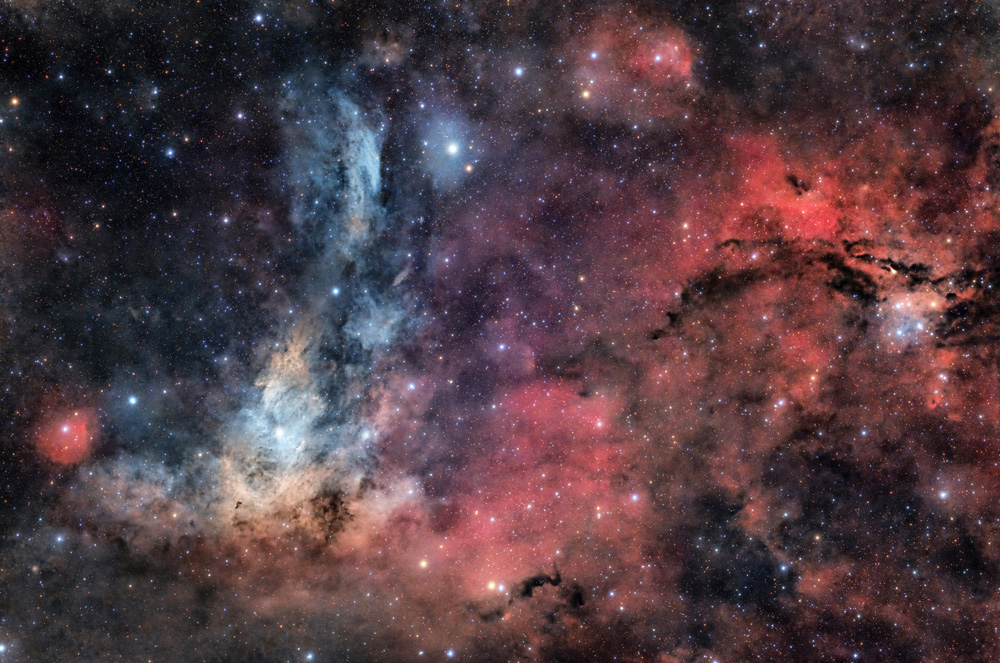
(Thumb only)
>>>High Resolution: http://astrophoto-hannover.de/downloads ... s_Horn.jpg
Equipment & Capture Info:
Celestron RASA 8 f/2
Celestron Motorfocuser
EQ6-R Pro
ZWO ASI 2600 MC Pro (Gain 100, Offset 18, -10°)
RGB: 300 × 30″ (2h 30′)
RGB (IDAS LPS-D3 Filter): 260 × 120″ (8h 40′)
TS 2600 MP Mono (Gain 100, Offset 50, -10°)
Ha: (Baader H-alpha Highspeed Ultra-Narrowband 3.5nm Filter): 130 x 60 (2h 10')
Total: 13 h 20'
Flats, Darkflats, Dithering
N.I.N.A., Guiding: ZWO ASI 120MM und PHD2
Astropixelprocessor, Photoshop, Pixinsight
Date: November 23, December 8 & 15, 2022 / New edit November 2023
Location: Hannover, Germany (Bortle 5-6)
Contact:
Website:
www.astrophoto-hannover.de
Instagram: @astrophoto_hannover
Astrobin:
https://www.astrobin.com/users/Groovynight/
E-Mail:
info@astrophoto-hannover.de
Re: Submissions: 2023 October
Posted: Thu Nov 02, 2023 5:24 pm
by salvatorecerruto
 Partial lunar eclipse
Partial lunar eclipse by
Salvatore Cerruto, su Flickr
The partial lunar eclipse of October 28th and the conjunction between the moon and Jupiter. The main Jovian satellites can be clearly distinguished: Io, Callisto, Europa and Ganymede.
Technical data: Nikon D800 + Tamron 100-400mm, merge of 3 shots @230mm, f/5.6, taken by the same position and at the same time (few seconds interval between shots)
Date: October 28, 2023
Author: Salvatore Cerruto
Location: Modica, Italy
Re: Submissions: 2023 October
Posted: Fri Nov 03, 2023 9:57 am
by Xeebok
Sh2-114 - The Flying Dragon
https://www.astrobin.com/wlm6w9/B/
credits: Ahmed Wegdan & Mark Ellis
The image is a combination of 2 data sets 31h and 36 mins in July 2023 and 18 hours in October 2021 a total of 49.5 hours
Location: Chandler, Arizona, United State By Mark Ellis
Imaging Telescopes: Planewave CDK14 + Planewave Reducer 0.66x CDK12.5-14-17
Imaging Cameras: QHYCCD QHY600PH M SBFL (Short back-focal length)
Mounts: Planewave L-350
Filters:
Chroma Lum 50 mm
Chroma Red 50 mm
Chroma Green 50 mm
Chroma Blue 50 mm
Chroma H-alpha 3nm Bandpass 50 mm
Chroma SII 3nm Bandpass 50 mm
Image Acquisition: Mark Ellis
Processing: Ahmed Wegdan

Re: Submissions: 2023 October
Posted: Fri Nov 03, 2023 6:13 pm
by astrosama
Jupiter at the Opposition and Closest approach above the Pyramids of Giza
Following a fantastic night spent within the Great Pyramid complex, we captured this breathtaking image for Jupiter's closest approach to Earth.
The ancient Egyptians known Jupiter and called it " Horus who illuminates the two lands "
 Jupiter Closest approach above the Pyramids of Giza
Jupiter Closest approach above the Pyramids of Giza by
osama Fathi, on Flickr
Location: Giza, Egypt
 Jupiter Closest approach above the Pyramids of Giza-annotated
Jupiter Closest approach above the Pyramids of Giza-annotated by
osama Fathi, on Flickr
Gears:
Nikon z6 , Nikkor 14-24
Settings :
Single shot 2sec , Iso 125, f3.2
another shot added to enhance HDR, 1/8 sec ، iso 1000
Softwares :
Adobe Photoshop
Credit :
Osama Fathi :
https://www.instagram.com/osama.fathi.nswatcher85/
https://www.facebook.com/NSWatcher/
Cairo, Egypt
Re: Submissions: 2023 October
Posted: Sat Nov 04, 2023 9:11 am
by 1lostone
Horsehead Nebula in SHH

The Iconic Horsehead Nebula with a twist. This consits of 12hrs of data. I decided I wanted something diffrent from the normal Horsehead.
I took 10hrs of Ha and 2 hrs of Sii and did a combination of SHH. This is the results of that combination
Image taken with my CDK14 from my B-8 back yard. Processed it using Pixinsight.
I like how this came out and to be honest it's the best Horsehead I've done.
Planewave CDK 14
Planewave L-350 Mount
QHY 268M Pro
Chroma 50mm Filters
Hope you enjoy it.
Re: Submissions: 2023 October
Posted: Sat Nov 04, 2023 12:20 pm
by bluvega
The Cocoon nebula (IC 5146)
Telescope: Vixen AX103S
Camere: ZWO ASI ASI 294 PRO
Mount: iOptron iEQ45-pro
Software: Pleiades Astrophoto S.L. PixInsight V1.8 , PHD2 Guiding PHD 2.6.2
Light: 102x300" (gain: 200.00) -5°C bin 1x1
Location: Santa Cesarea Terme (Italy)
Sky bortle 4/5
The Cocoon nebula
https://www.flickr.com/photos/bluvega/
Copyright: Salvatore Cozza
 Cocoon Nebula (IC 5146)
Cocoon Nebula (IC 5146) by
Salvatore Cozza, su Flickr
Sol
Posted: Sat Nov 04, 2023 7:09 pm
by MrRat
Birth Of A Phoenix
We enter a new age where the bounds of observation and photography are opening to everyone at the push of a button in a phone app. The barriers of cost and skill are being removed to provide learning and enjoyment to a much wider audience.
A single shot capture of a Turkey Vulture in front of the Sun using the ZWO SeeStar50 smart telescope sitting on top of my car in Hartford, AL, USA on Nov. 4th, 2023
49H MOSAIC ON VEIL NEBULA IN HOO / RGB STARS
Posted: Sun Nov 05, 2023 5:46 pm
by Astroben
Hello
I would like to submit my last Picture.
This is a 49H , 2 panel Mosaic, on the Veil Nebula.
This image is the result of a desire to reveal the maximum level of detail in the Cygnus Veil Nebula using a purely amateur instrument.
It is comprised of a total of 49 hours of exposure time, spread across 2 mosaics, including approximately 13 hours and 30 minutes in Hydrogen-Alpha, 9 hours in Oxygen-III, and a bit more than 2 hours of RGB data for the stars, all of this on each panel.
The image captures were taken over a period of 3 weeks because I aimed to prioritize only those nights when the target was at an altitude of more than 60/70 degrees, in order to obtain the cleanest possible signal.
The equipment used is within the realm of amateur astronomy, consisting of an FRA400 telescope equipped with an ASI 2600MM, all mounted on a ZWO AM5. This is a mobile setup ,no fixed observatory, and it was all captured under the French Picardie sky, teaching you the value of patience...
Ha: 404*240s
OIII: 263*240s
Red:145*40s
Green:148*40s
Blue:151*40s
( 1111 pictures Total )
Processing was done only with Pixinsight, and Photoshop for final editing
Clear Skies to all !

Re: Submissions: 2023 October
Posted: Sun Nov 05, 2023 7:04 pm
by Rafeee
Once in a Decade
Copyright: Rafael Schmall
https://www.astrobin.com/users/Rafeee/
Perhaps the most spectacular and strongest Aurora Borealis of the last 20 years that could be observed from Hungary. It regularly cast shadows and you could see the colors.
Image Details:
Equipment: Canon EOS6D, Canon 50mm f/1.4, SkyWatcher Star-Adventurer
Exif data: 5sec, ISO3200, 50mm
Processing: Photoshop
Location: Hungary, Somogy, Kaposfo
Re: Submissions: 2023 October
Posted: Sun Nov 05, 2023 11:21 pm
by Julien Looten
SAR Arc in France
https://www.flickr.com/photos/julienlooten/
Copyright: Looten Julien

Solar activity over the last few days has led to the emergence of spectacular aurora borealis that can be seen this evening and tonight in France. There was an impressive peak of auroras at around 6.15 this evening, but unfortunately the clouds prevented me from photographing them...
However, despite a few rain showers, I finally managed to capture a vast panorama (180°, from west to east), allowing me to capture a red auroral arc, known as the SAR (Stable Auroral Red) arc. This is surmounted by the arch of the Milky Way.
The SAR arc is a band of reddish light observable in the sky. It is a rare phenomenon at these latitudes (50.2°). Unlike traditional (polar) aurorae, which display a variety of colours and dynamic patterns, SAR arcs display a fixed colour and remain motionless. This one was visible almost at zenith in the sky. Although geomagnetic activity due to an eruption of charged particles from the Sun triggers both aurorae and SAR arcs, their formation mechanisms differ slightly...
While auroras are created when energetic particles collide with atoms in the atmosphere, SAR arcs are generated by the enormous thermal and kinetic energy of the Earth's atmosphere (around 3000°C).
SAR arcs form at an altitude of around 400 km, well above the classic aurora borealis located between 90 and 150 km. SAR arcs occur during geomagnetic storms, as was the case when the KP index was around 7 at around 7.50pm this evening.
Equipment used

: Canon 6D Astrodon (scrolled) - Sigma 28mm F1.4 - 33 shots to form the panorama - Individual exposure of 6 seconds
 SH2-119. The clamshell Nebula by Astro Divers, su Flickr
SH2-119. The clamshell Nebula by Astro Divers, su Flickr SH2-119. The clamshell Nebula by Astro Divers, su Flickr
SH2-119. The clamshell Nebula by Astro Divers, su Flickr


